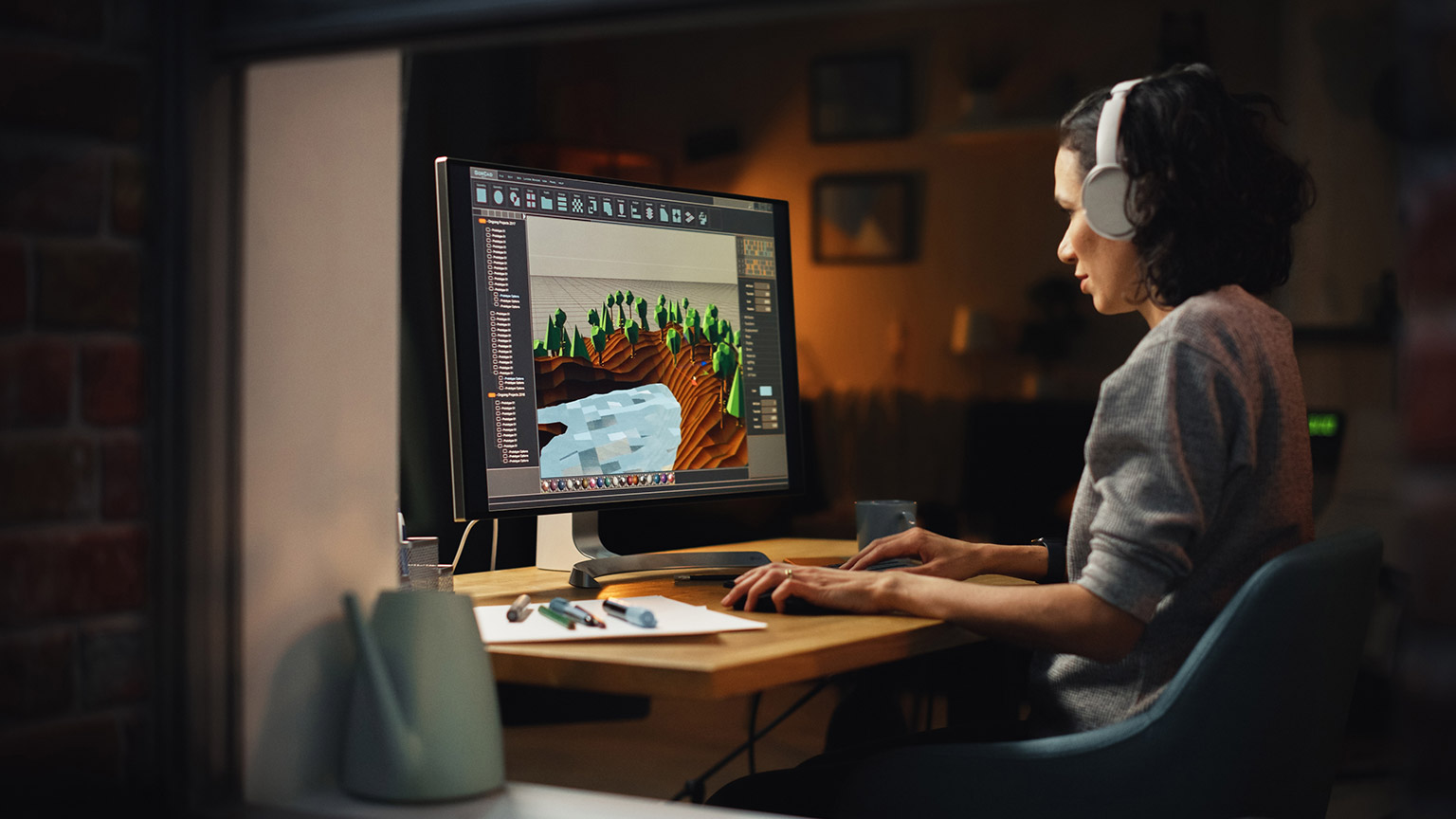You’ve reached the final phase of your Diploma in Animation (Level 5) journey! In this Final Image module, you'll harness all the skills and knowledge you've gained throughout the course to plan, design, and produce a short animated sequence, marking the culmination of your learning experience.
In the initial four weeks, dive into concept development and storyboarding for your sequence as you explore visual storytelling techniques. With a focus on various visual storytelling theories and techniques, equip yourself with the tools to bring your creative vision to life.
As you progress into the final six weeks, you'll shift towards the production phase. You’ll break down your storyboard into actual production tasks for you to complete, translating your story concept into a compelling animated sequence.
This module covers two topics:
- Visual Storytelling
- Final Sequence
The fine print
This module supports the following learning outcomes for you to achieve:
- Apply a range of modelling, texturing, camera and animation tools and processes with precision and accuracy while developing final shot sequences within a multidisciplinary animation production environment.
- Integrate planning, management and feedback processes within a creative pipeline while producing final animation shot sequences in response to a complex project brief.
- Evaluate aesthetic qualities to make improvements to a final shot or animation sequence in response to a complex project brief.

Work through topics in sequence
As you progress through this module, work through each topic and learning task sequentially, i.e. in order as they appear. The learning for this module has been developed specifically to work in sequence. As you progress, the learning tasks you complete build upon each other, and some are key to helping you with your two assessment submissions.
Learning tasks
When you focus on a learning task, read it carefully to check when you need to use a Forum to share your coursework (e.g. image or multimedia files) with your facilitator and fellow students - you'll get specific guidance on how to do this. Using Forums is a great way of improving your animation skills through constructive feedback and helps you keep track of your progress through this module.
Manage your time
Your project check-ins
As you enter this final stretch of the Diploma in Animation (Level 5), get ready to immerse yourself in your final animation project during the Final Project Sequence topic in this module’s last six weeks.
Staying organised and focused is key to your success – project check-ins are designed to help you do this.
What are project check-ins?
Project check-ins are weekly online meetings between you and your facilitator to provide the guidance and support you need to stay on track with your final animation project.
Led by your facilitator, project check-ins allow you to review your progress, receive valuable feedback, and plan your upcoming project tasks.
How do project check-ins work?
During the final six weeks of this module, you can schedule your weekly project check-ins with your facilitator via Calendy.
During the check-ins, you'll have the opportunity to showcase your animation production work, discuss your achievements and challenges from the previous week, and plan your tasks for the current week.
What can you expect?
- Review the previous week: Reflect on your progress from the previous week, discussing what went well and areas for improvement.
- Plan the current week: Collaborate with your facilitator to set achievable goals and outline your to-do list for the upcoming week.
- Showcase your work: Use screen-sharing to showcase your animation production work, receiving real-time feedback and insights.
Your learning
Start the first topic – Visual Storytelling – in your first week.
The total learning hours of this module are 300 hours. That’s 30 hours per week, over ten weeks. This includes you:
- reading, watching, and completing learning tasks
- attending project check-ins
- participating in or viewing Live Sessions
- preparing and completing assessments.
Learning hours are ‘facilitated asynchronous’, which means you complete your learning hours in your own time. However, you will need to be active in the Forums, Project Check-Ins, and Live Sessions.
Your assessments
You need to prepare your evidence for this module’s two assessments throughout the ten weeks. We recommend you start this preparation in your first week.
The weeks that your assessment work needs to be submitted are:
- Week 4 – Assessment 1 (Final project pre-production)
- Week 10 – Assessment 2 (Final project sequence)
Maximise your project potential
The last six weeks of this module see you diving into an immersive project-based experience, allowing you to explore and grow further as an animator and preparing you for success in professional settings.
As you embark on your final project sequence, prioritise the following aspects:
- Time management: Effectively manage your time to meet project milestones. Break down your project into manageable tasks and create a realistic timeline to ensure steady progress.
- Self-regulation: Own your project journey by setting goals, monitoring your progress, and adapting your approach as needed. Practise self-discipline and resilience to overcome challenges and focus on achieving your project objectives.
- Reflection: Regularly reflect to deepen your understanding, identify areas for improvement, and celebrate your successes. Review your work, seek feedback from your facilitator (see ‘Your project check-ins’ above), and incorporate insights into your final project sequence.
Tip
Explore your growth within projects
Reflection is a powerful tool for growing and improving as an animator when working on projects.
But how does it work?
Take a few moments after completing a project task to ask yourself three main questions:
- What did I learn from this experience (e.g. a project task)?
- What went well, and why?
- What could I improve or do differently next time?
Regularly practising this reflective process will give you valuable insights into your strengths and areas for your development, leading to better visual storytelling and animated sequences.
Practice makes perfect
The practical nature of this module requires a high level of participation from you. Throughout your learning journey, focus on using the tools and resources in each topic as you work through the module.
Aim to complete all the learning tasks. Doing so will:
- help you practise and reinforce new skills and habits
- prepare you for the assessments
- make you feel more confident when completing assessment work.
The work you do by completing the learning tasks will prove very handy for the assessment work you need to prepare and submit.

